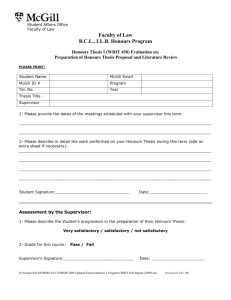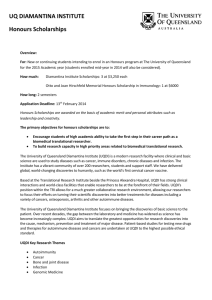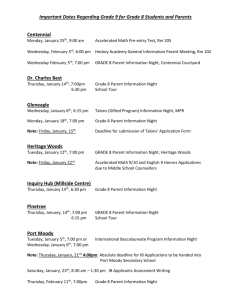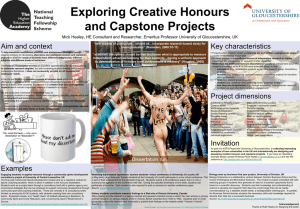LTC12-P19 - Loughborough University
advertisement
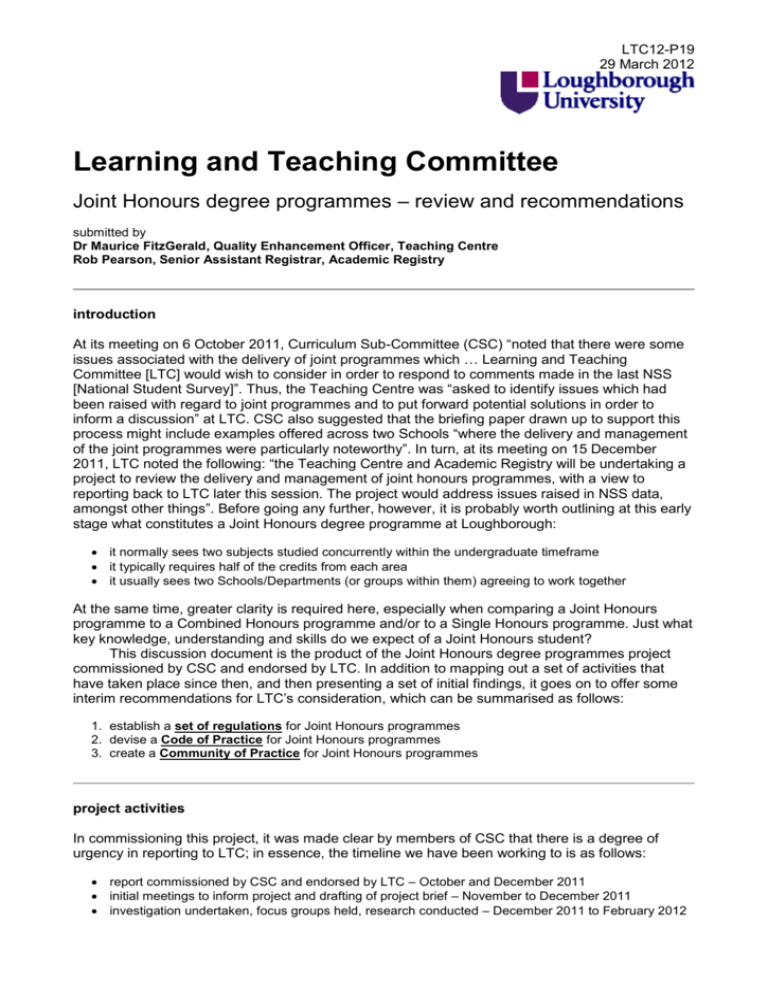
LTC12-P19 29 March 2012 Learning and Teaching Committee Joint Honours degree programmes – review and recommendations submitted by Dr Maurice FitzGerald, Quality Enhancement Officer, Teaching Centre Rob Pearson, Senior Assistant Registrar, Academic Registry introduction At its meeting on 6 October 2011, Curriculum Sub-Committee (CSC) “noted that there were some issues associated with the delivery of joint programmes which … Learning and Teaching Committee [LTC] would wish to consider in order to respond to comments made in the last NSS [National Student Survey]”. Thus, the Teaching Centre was “asked to identify issues which had been raised with regard to joint programmes and to put forward potential solutions in order to inform a discussion” at LTC. CSC also suggested that the briefing paper drawn up to support this process might include examples offered across two Schools “where the delivery and management of the joint programmes were particularly noteworthy”. In turn, at its meeting on 15 December 2011, LTC noted the following: “the Teaching Centre and Academic Registry will be undertaking a project to review the delivery and management of joint honours programmes, with a view to reporting back to LTC later this session. The project would address issues raised in NSS data, amongst other things”. Before going any further, however, it is probably worth outlining at this early stage what constitutes a Joint Honours degree programme at Loughborough: it normally sees two subjects studied concurrently within the undergraduate timeframe it typically requires half of the credits from each area it usually sees two Schools/Departments (or groups within them) agreeing to work together At the same time, greater clarity is required here, especially when comparing a Joint Honours programme to a Combined Honours programme and/or to a Single Honours programme. Just what key knowledge, understanding and skills do we expect of a Joint Honours student? This discussion document is the product of the Joint Honours degree programmes project commissioned by CSC and endorsed by LTC. In addition to mapping out a set of activities that have taken place since then, and then presenting a set of initial findings, it goes on to offer some interim recommendations for LTC’s consideration, which can be summarised as follows: 1. establish a set of regulations for Joint Honours programmes 2. devise a Code of Practice for Joint Honours programmes 3. create a Community of Practice for Joint Honours programmes project activities In commissioning this project, it was made clear by members of CSC that there is a degree of urgency in reporting to LTC; in essence, the timeline we have been working to is as follows: report commissioned by CSC and endorsed by LTC – October and December 2011 initial meetings to inform project and drafting of project brief – November to December 2011 investigation undertaken, focus groups held, research conducted – December 2011 to February 2012 LTC12-P19 29 March 2012 discussion document drafted, and then presented at LTC – March 2012 Given the range of programmes which take place at Loughborough, and in the light of the NSS feedback received last summer, it was decided that the Joint Honours programmes which would form the backdrop to this investigation would be those based in the School of Business and Economics (SBE), the School of Science (SCI), the School of Social, Political and Geographical Sciences (SPG), and the School of Sport, Exercise and Health Sciences (SSEHS) rather than all ten Schools – see appendix: Joint Honours programmes in SBE, SCI, SPG & SSEHS. It is worth noting that no readily accessible central registry of Joint Honours programmes currently appears to exist, and that the information was drawn from School/Department websites. In order to facilitate discussion at LTC, it was also suggested that preliminary discussions might be conducted with staff and students. For a number of reasons, including logistics, the following exploratory question was posed to separate and discrete staff and student focus groups: “what is your experience/perception of joint honours programmes in your Department/School, across campus, and/or beyond Loughborough?” participants at student focus group held on 17 January 2012 LSU – Emma Dresser & Jayde Savage SBE – Peter Bailey, James Carroll & James Holmes SCI – Emily Belford & Rebecca Defoe SPG – Fiona Bowen & Stuart Healey SSEHS – N.B. two of the above are Sports Science Joint Honours students participants at staff focus group held on 19 January 2012 SBE – Dr Paul Hughes SCI – Jo Corlett & Prof Ray Dawson SPG – Rachel Breen, Prof Ruth Kinna & Dr Thoralf Klein SSEHS – Dr Lorraine Cale & Dr Mike Hiley In addition, it was decided to make use of readily available University and School/Department resources, as well as materials at other universities, any information/advice from the Quality Assurance Agency (QAA), the Higher Education Academy, and indeed the academic literature. initial findings As things stand, the information available centrally regarding Joint Honours programmes at Loughborough might be said to be relatively thin; in fact, the only reference that could readily be found poses and answers a frequently asked question: Which ceremony do I attend if I am a joint honours student? Joint honours students should attend their home school (the school which administers your course). 1 With this assurance that Joint Honours students are indeed expected to graduate, there should doubtlessly be more resource for both staff and students to draw on. Even the terminology employed here regarding the ‘home’ School/Department suggests that some work may need to be done in ensuring that Joint Honours students feel as much a part of their ‘away’ School/Department as the title of their degree suggests. After all, the QAA argues that: … the successful management of joint … programmes requires a high level of mutual understanding and communication between students, teaching and support staff. In many joint … programmes, the provision of effective academic and personal tutoring and support arrangements for students constitutes the key to their successful progress through the programme. The converse also appears to hold, that where understanding or communication (or, worse, both) are imperfect, students’ learning opportunities may be 1. Graduation, “FAQ (Frequently Asked Questions)”, Loughborough University http://www.lboro.ac.uk/admin/ar/graduation/FAQ/index.htm#joint_honors [accessed 2 March 2012]. LTC12-P19 29 March 2012 less satisfactory and academic standards arrangements difficult to manage successfully. With respect to academic standards … students on joint … programmes can face a higher level of challenge to achieve a given class of award than their peers … 2 From the Loughborough perspective, it might be possible to break down some examples of effective practice from elsewhere and/or which take advantage of existing structures here, so that Joint Honours students are supported more consistently across campus, as well as at various and appropriate levels (i.e. in institutional terms, with regard to their School/Department, and through student representation). The following ideas were presented to the focus groups: institutionally carry a statement (e.g. Code of Practice) in Academic Quality Procedures Handbook regarding minimum expectations, and provide institutional oversight regarding: • the assessment and classification of these degrees at programme boards – in collaboration with external examiners and designated internal contact persons – to ensure transparency, fairness and consistency • the annual review of comparative progression, retention and attainment statistics • the approval of new, and updating of existing, programmes refer explicitly to them in the Loughborough Student Charter, and ensure consistency in their public presentation (e.g. prospectuses, websites, etc.) at Department/School level insert a brief statement into each relevant programme handbook, ensure that these students are given an appropriate and dedicated induction, and have it as a standing item in Learning and Teaching Committees and Staff Student Liaison Committees designate a central contact point in each School to provide oversight and ensure communication (including inter alia liaison with relevant Programme Directors/module convenors, these students’ Personal Tutors, their Programme Representatives, etc.) ensure that selected Personal Tutors are allocated to these students student representatives ensure that these students have appropriate representation and that the issues they raise are dealt with systematically and swiftly act as a means to exchange information (e.g. effective practices, across the campus, with LSU, etc.) and to promote this means of studying (e.g. through the establishment of a dedicated society) The focus groups were more than happy to shape the discussions which followed and, in essence, suggested the following: feedback from the student focus group in addition to the Admissions process and at Induction, students on Joint Honours programmes should receive follow-up and support at other opportune times during the course of their degree programme (e.g. when making module choices, to review their progression, etc.) the Joint Honours Programme Director needs to be proactive in terms of communications and coordination with both the Joint Honours students and the Schools/Departments/subjects (particularly for the ‘away’ half of the degree programme) there should be a named contact person for the ‘away’ half of a degree programme from the relevant School/Department/subject – this person should be acting as a liaison for the Joint Honours Programme Director and the Joint Honours students improved communication from the University, across Schools, etc., is clearly necessary but particularly with regard to the ‘away’ half of a degree programme – this would mean, for instance, Joint Honours students being added to both subject email lists (i.e. so that they can receive news regarding social gatherings, job/placement opportunities, etc., from the ‘away’ half of their degree programme) more effort is required from the ‘away’ half of the degree programme to support student identification with this half of their studies, affiliation with the second School/Department/subject, etc., and not for 2. See QAA, “Outcomes from institutional audit: Arrangements for joint, combined and multidisciplinary programmes”, http://www.qaa.ac.uk/Publications/InformationAndGuidance/Documents/ArrangementsJCMP.pdf (2008, second series), pp.18-9; also see QAA, “Outcomes from institutional audit: Arrangements for joint, combined and multidisciplinary honours degree programmes”, http://www.qaa.ac.uk/Publications/InformationAndGuidance/Documents/JointProgrammes.pdf (2006) [both accessed 2 March 2012]. LTC12-P19 29 March 2012 assumptions to be made regarding a student’s interests based on the first half of their named degree programme more consideration needs to be given to Personal Tutoring and the advice/support which is available from the academic and/or personal perspective from both halves of the degree programme SSLCs from the ‘away’ half of a degree programme should invite the Joint Honours student representatives to attend, that is in addition to the first named School/Department/subject also inviting them to attend/speak for the students they represent Joint Honours programmes need to be more coherent and thought-through in terms of design and reality, they might even inform each other a bit more, certainly by the time it comes to the possibilities inherent in a final year dissertation/project, placements and employability feedback from the staff focus group create a contacts list3 (i.e. as the initial go-to person for administrators, module convenors, Personal Tutors, programme directors, students/student representatives, etc.) in order: • to support colleagues/students in each of the ten Schools • to promote interaction between those colleagues listed • to help address/pre-empt any issues such as assessment deadlines, submission mechanisms, timetabling, etc. • to promote coherence and consistency for both staff and students across Joint Honours programmes ensure that appropriate guidance is given by Curriculum Sub-Committee on this issue, so that Joint Honours programmes are increasingly appropriate, coherent and robust by design (i.e. through their programme specifications, particularly their aims and ILOs), so that a Joint Honours student is equipped to pursue a career in either discipline should they so wish, and that essential knowledge, understanding and skills are prioritised ahead of the desirable safeguard against minor changes to the constituent elements of a Joint Honours degree programme in the ‘home’ and/or ‘away’ School/Department cumulatively, or indeed individually, having the effect of a more profound change support Joint Honours programme directors by ensuring that the skill sets and support elements implicit in a Single Honours programme are also made more explicit both to students and module convenors across a Joint Honours programme (e.g. for those degrees shared across two Schools, where one half of the degree might be more scientific in nature and the other half more social science, certain issues – such as what transferable skills will the students be expected to acquire/develop and where – might need to be explored in more depth) it is worth noting that, while the Mathematics Education Centre is able to provide students with additional mathematics and/or statistics support, this may not be the case for other skills required of a Joint Honours student (e.g. what provision is available to those students requiring essay writing skills? can this be achieved through programme design alone?) trigger an explicit review of existing provision, perhaps through the next set of Annual Programme Reviews in 2012-13 as a one-off exercise, so that any issues regarding the coordination of programmes, the design of the curriculum, etc., are explored – this would include module information from the ‘away’ School/Department being made available at the ‘home’ APR review confirm that Joint Honours students are invited to participate fully in Staff Student Liaison Committees, in part by ensuring that items raised in the ‘home’ School/Department are also flagged up with the ‘away’ School/Department, and that actions are completed consider how the Joint Honours student lifecycle (i.e. from recruitment/admissions and induction, as well as throughout a degree programme – e.g. module choices – and on to graduation) might be supported through Personal Tutoring, while ensuring that staff are aware of the limits of a Joint Honours student’s possible engagement with the elements of their programme when compared to a Single Honours student and be neutral in respect of them (i.e. willing to support the pursuit of Joint Honours and not steer students in particular directions) introduce a minimum level of formal progress monitoring by the ‘away’ School/Department so that, while ensuring that this is not burdensome or duplicatory, it confirms that performance below a certain standard triggers an invitation to a progress meeting on the away side and/or that all students get a confirmation of expected performance from the ‘away’ School/Department via co-tutor ensure that the induction process is as supportive as possible, for example by involving the contact person in the ‘away’ School/Department at induction, by having some part of the induction day 3. Please note that, in certain Schools, this may see contact persons at Departmental-level – e.g. two/three persons in SPG to reflect the various sets of programmes offered by PHIR and Geography – but the number of names on this University-level contacts list should be relatively limited in order to support coherence and consistency. LTC12-P19 29 March 2012 devoted to Joint Honours students describing practical aspects of how to deal with the other School/Department (e.g. where to report problems), etc. share effective practices across campus – e.g. by examining how the idea of explicit pathways for Joint Honours programmes might be disseminated; by alerting students to the possibilities, as well as the responsibilities, inherent in their Joint Honours programmes when it comes to placements, dissertation/project choices (i.e. facilitating the possibility of conducting undergraduate research that draws on both elements of study, whilst noting that certain Joint Honours programmes do not require a student to undertake a dissertation/project); etc. ensure that oversight and communications mechanisms are as strong as possible – i.e. so that: • relevant staff, including those in the ‘away’ School/Department, have access to co-tutor records • information is shared via Learn (incl. Departmental Information pages) and/or other intranet pages, such that students would be able to see some, though not necessarily all, of the information from their ‘away’ School/Department • emails to Joint Honours students come from both ‘home’ and ‘away’ Schools/Departments interim recommendations In terms of project outputs, and based upon the feedback received from the focus groups, a number of relatively obvious suggestions might be made at the outset, including generating: 1. a set of regulations for Joint Honours programmes to be held centrally by Academic Registry and updated annually by CSC in order to support programme design, for example: • in clarifying which programmes are Joint or Combined Honours through their nomenclature • by ensuring that programme and/or module ILOs are appropriate • when considering the skill sets implicit in a Joint Honours programme (especially for those degrees shared across two Schools, where one half of the degree might be more scientific in nature and the other half more social science, certain issues – such as the transferable skills that the students are expected to acquire/develop and where – might need to be explored in more depth and regularly reviewed) 2. a Code of Practice for Joint Honours programmes that might inter alia include a minimum threshold: • named and readily identifiable administrative and academic contacts in individual Schools (and/or their constituent Departments) • explicit advice on Personal Tutoring • information regarding Staff-Student Liaison Committee (SSLC) meetings • a standing item on School/Department Learning and Teaching Committee meetings • advice on common communications mechanisms for both ‘home’ and ‘away’ students • a generic common statement for Joint Honours programme handbooks which would, amongst other things, consider student expectations/perspectives 3. a Community of Practice for Joint Honours programmes so that staff leading on Joint Honours programmes might have a mechanism to share effective practices and/or to communicate with their peers – this would have the virtue of creating a de facto contacts list (i.e. as the initial ‘go to’ person for administrators, module convenors, Personal Tutors, programme directors, students/student representatives, etc.), and would therefore be set up in order: • to support colleagues/students in each of the ten Schools (and/or their constituent Departments) • to promote interaction between those colleagues listed • to help address/pre-empt any issues such as assessment deadlines, submission mechanisms, timetabling, etc. • to provide coherence and consistency for both staff and students across Joint Honours programmes Depending upon discussions at LTC, it is anticipated that the project will have concluded its work and disseminated any resulting outputs in advance of academic year 2012-13. LTC12-P19 29 March 2012 appendix: Joint Honours programmes in SBE, SCI, SPG & SSEHS School of Business and Economics http://www.lboro.ac.uk/departments/sbe/ug/economics/econ-hons/index.html • Economics with Geography (Combined Honours) • Economics with Politics (Combined Honours) • Economics with Accounting School of Science http://www.lboro.ac.uk/departments/cm/undergrad/ChemSSprog.html http://www.lboro.ac.uk/departments/co/undergrad/index.html http://www.lboro.ac.uk/departments/dis/studying/studying.html http://www.lboro.ac.uk/departments/ma/admissions/uginfo/index.html http://www.lboro.ac.uk/departments/ph/teaching/index.html Department of Chemistry • Chemistry and Sports Science Department of Computer Science • Information Technology Management for Business • Computing and Management • Computer Science and Maths Department of Information Science • • • • Information Management & Business Studies Information Management & Computing Publishing and English Information Management and Web Development • • • • • • • Mathematics and Accounting & Financial Management Mathematics with Economics Mathematics and Management Mathematics with Mathematics Education Mathematics and Sports Science Mathematics with Statistics Financial Mathematics School of Mathematics Department of Physics • Physics and Mathematics • Physics and Management School of Sport, Exercise and Health Sciences http://www.lboro.ac.uk/departments/ssehs/undergraduate/index.html • • • • • • Chemistry and Sports Science English and Sports Science Geography and Sports Science Mathematics and Sports Science Sports Science and Physics Geography and Sport Management School of Social, Political and Geographical Sciences http://www.lboro.ac.uk/departments/eu/studying/undergraduate/programmes.html http://www.lboro.ac.uk/departments/gy/admissions/programmes.html LTC12-P19 29 March 2012 Department of Politics, History and International Relations • Politics with a minor subject (available in Communication and Media Studies, Economics, English, Management, Sociology, Social Policy, Social Psychology, plus French, German and Spanish) • • • • History and International Relations History and Politics History and English History and Geography • • • • Geography and Management Geography and Sport Management Geography and Sports Science Geography with Economics Department of Geography

